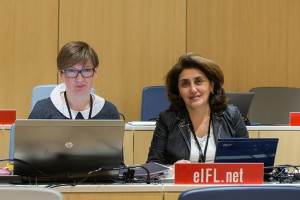Some interesting proposals will soon be under discussion at the World Intellectual Property Organization that could free libraries, archives, educational and research institutions, and people with disabilities from copyright provisions that hamper their ability to make use of copyright works.
The World Intellectual Property Organization’s committee on copyright meets this upcoming June 29 to July 3. Three main topics will be under discussion: first, the possible establishment of a treaty granting intellectual property protection for broadcasting organizations; second, the possible establishment of an international instrument setting out copyright limitations and exceptions for libraries and archives; and, third, the possible establishment of an international instrument setting out limitations and exceptions for educational and research institutions and for persons with other disabilities.[1]
The need for limitations and exceptions by libraries was laid out in 2011 by a number of library organizations, which noted that:
- preservation of print and digital materials is a matter of increasing concern as “born digital” documents must be retained, print documents must be preserved and sometimes repaired, and digital lock increasingly make the job of preservation difficult or impossible.
- libraries and archives must increasingly collaborate across institutions and borders, and copyright law must “catch up” to reflect this.
They suggested that an international treaty could enable libraries and archives to better preserve works; to support education, research, private study; and to support people with disabilities in accessing content (p. 5).
Currently two sets of proposals, one by the USA, and the other by the African Group, Brazil, Ecuador, India and Uruguay, are on the table for discussion. Both sets of proposals would:
- encourage copyright regimes that would enable preservation;
- encourage legal deposit regimes; and
- encourage limitations on liability for libraries and archives acting in good faith.
However, the proposals of the African Group, Brazil, Ecuador, India and Uruguay go much further to also encourage countries to enable:
- acquisition of works by libraries via parallel import where a member state does not provide for international exhaustion;
- cross-border use of works between library and archive institutions;
- libraries and archives to reproduce and make available orphan works;
- circumvention of digital locks for the purposes of making use of limitations and exceptions outlined in the instrument;
- elimination of the contractual overrideability of limitations and exceptions; and
- libraries and archives to translate works for the purposes of teaching, scholarship and research.
It is expected that at the next session discussion will continue on these proposals, and that an additional document by the chair will also be discussed (13).
[Original post available here.]
—
[1] Knowledge Ecology International provides extensive information on the first topic.
The broadcasting discussions have been ongoing for ten years, as was noted by the Brazilian delegate at the last meeting of the committee (Draft report, p. 17). The latter two sets of discussions have gathered some momentum after the successful adoption of WIPO’s first treaty on limitations and exceptions for the visually impaired.
